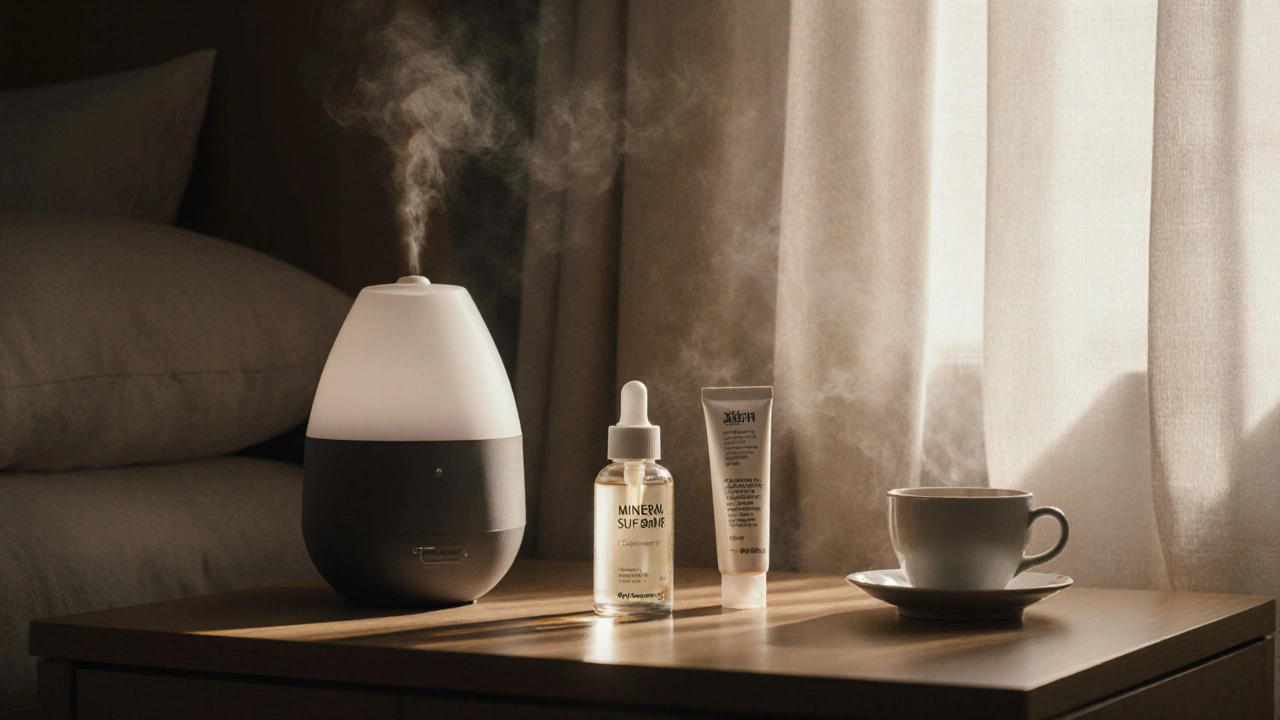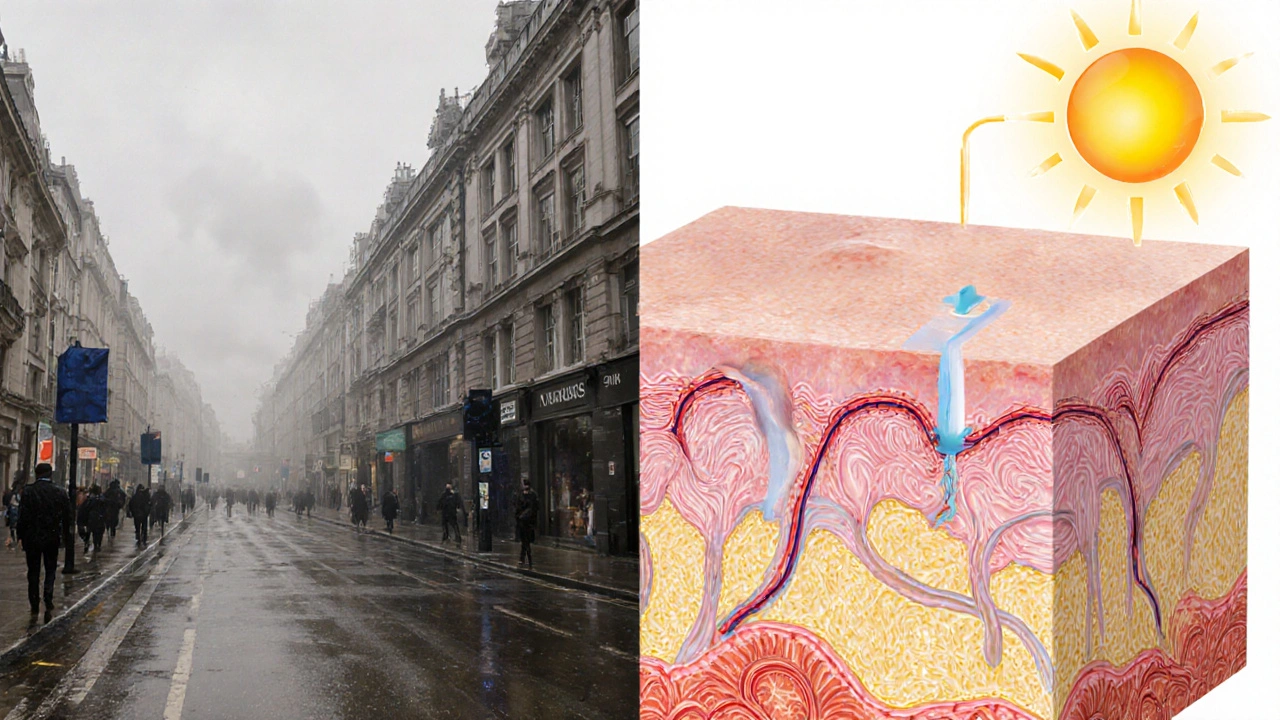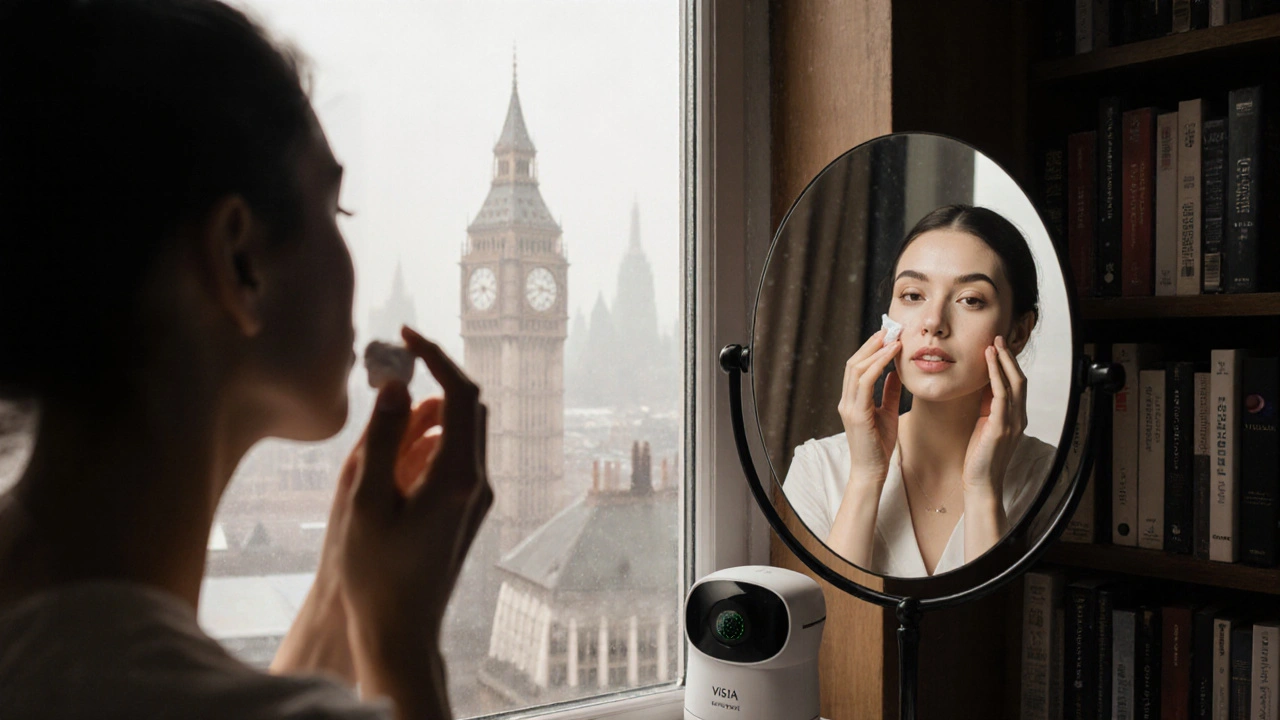
Londoners are spending more on skincare than ever before-not just to look younger, but to keep their skin healthy for decades. It’s not about chasing a fleeting glow anymore. People here want skin that lasts. They want to wake up at 60 with the same clarity, resilience, and radiance they had at 40. That shift is changing what’s on pharmacy shelves, in dermatologist offices, and in luxury beauty boutiques across the city.
What Makes Anti-Aging Skincare Work in London?
The air here is damp, polluted, and cold for half the year. That’s not just uncomfortable-it’s hard on your skin. A 2024 study from King’s College London tracked 1,200 residents aged 35-65 and found that those using targeted anti-aging products saw 37% less collagen breakdown compared to those using basic moisturizers. The difference wasn’t just in price-it was in ingredients.
Effective anti-aging products in London don’t rely on buzzwords like "miracle" or "youth serum." They work because they contain proven, science-backed actives at effective concentrations. Look for these:
- Retinoids (especially prescription-grade tretinoin): The gold standard. Boosts cell turnover, thickens dermis, fades sunspots. Used nightly by 72% of London dermatology patients over 40.
- Vitamin C (L-ascorbic acid, 15-20%): Neutralizes pollution-induced free radicals. Essential for city dwellers. Brands like SkinCeuticals and The Ordinary both offer stable, high-potency versions sold in Covent Garden and Notting Hill.
- Peptides: Signal skin to rebuild collagen. Pentapeptides and hexapeptides are common in high-end serums from brands like La Mer and Dr. Barbara Sturm, both with flagship stores in Mayfair.
- Niacinamide (5-10%): Reduces redness, strengthens barrier, controls oil. Works well with retinoids and is gentle enough for sensitive skin.
- Hyaluronic acid (multi-molecular weight): Not just hydration. Helps plump fine lines and locks in other actives. Look for formulations with both low- and high-weight molecules.
London’s top dermatologists agree: layering matters. A simple routine-cleanser, vitamin C in the morning, retinoid at night, moisturizer with ceramides-works better than buying ten expensive bottles.
Where to Buy Anti-Aging Products in London
You don’t need to spend £200 on a jar to get results. But you do need to know where to look.
Pharmacies like Boots and Superdrug carry solid options. The Ordinary’s Niacinamide 10% + Zinc 1% is £5.90 and has been a bestseller since 2022. Their Hyaluronic Acid 2% + B5 is £7.50. Both are backed by clinical data and used by dermatology residents at St. Thomas’ Hospital.
Specialist skincare boutiques like Skincare by Dr. Lai in Chelsea or The Beauty Edit in Notting Hill offer curated, medical-grade lines. These shops don’t just sell-they test. Many offer free skin analysis using VISIA imaging, which shows UV damage, pore size, and pigmentation levels you can’t see with the naked eye.
Medical aesthetics clinics in Harley Street and Belgravia offer prescription-only products you can’t buy online. Tretinoin 0.05% or 0.1% requires a consultation, but results are measurable: 80% of patients report visible improvement in texture and tone within 12 weeks.
And yes, luxury brands like La Prairie and Sisley have stores here. Their products are beautiful, but their price tags often reflect packaging and scent more than active potency. Don’t assume expensive = better.
What Doesn’t Work (And Why)
Londoners have tried it all. Collagen creams. Jade rollers. LED masks bought off Amazon. Most don’t deliver.
Topical collagen? It’s too large to penetrate the skin. It sits on top, giving a temporary plump-like a moisturizer with glitter. It doesn’t rebuild what’s lost.
"Natural" oils like rosehip or argan? Great for hydration, but they don’t stimulate collagen or reverse sun damage. They’re nice additions, not replacements.
Expensive serums with 17 ingredients? Often a marketing trick. The more ingredients, the higher the chance of irritation. Simplicity wins.
And don’t fall for "anti-aging" claims on products that don’t list active concentrations. If a bottle says "contains retinol" but doesn’t say how much, it’s probably less than 0.1%-too low to matter.

Real Results: What Londoners Are Seeing
Emma, 52, a teacher in Hampstead, started using tretinoin 0.025% and vitamin C in January 2024. She didn’t change her diet or sleep habits. Just her skincare. By June, her dermatologist noted a 22% increase in dermal thickness on her cheek. Her fine lines around the eyes softened. She stopped wearing foundation daily.
James, 48, a financial analyst in the City, used to rely on concealer for dark circles. He switched to a peptide serum with caffeine and niacinamide. After four months, his under-eye area looked less hollow. Not because of filler-because his skin regained tone.
These aren’t outliers. A 2025 survey of 800 London skincare users found that 68% saw visible improvement in skin texture within 3 months when using consistent, science-backed routines. The biggest factor? Consistency, not cost.
The Longevity Mindset
The best anti-aging product in London isn’t a serum. It’s sunscreen.
UV exposure causes 80% of visible aging. Even on cloudy days, UVA rays penetrate. Londoners who use SPF 30+ daily, every day, show 50% less photoaging than those who skip it.
Look for mineral sunscreens with zinc oxide (20% or higher). They’re less irritating, better for sensitive skin, and don’t degrade in heat. La Roche-Posay Anthelios and Avene High Protection are widely available and trusted by dermatologists.
Hydration matters too. Drink water. Use a humidifier in winter. Skip alcohol-heavy toners. Your skin isn’t a machine-it’s an organ. Treat it like one.
And sleep. Seven hours. No exceptions. Growth hormone peaks during deep sleep. That’s when your skin repairs itself. No cream can replace that.

Getting Started: A Simple 3-Step Routine
Don’t overcomplicate it. Start here:
- Morning: Gentle cleanser → Vitamin C serum → Moisturizer with niacinamide → SPF 30+ mineral sunscreen
- Night: Cleanser → Retinoid (start with 0.025% every other night) → Moisturizer with ceramides
- Weekly: One gentle exfoliation (lactic acid or PHA, not scrubs) to remove dead skin
Wait 20 minutes after applying retinoid before moisturizing. This reduces irritation. If your skin stings or flakes, cut back to twice a week. Patience is part of the process.
Give it 12 weeks. That’s how long it takes for new collagen to form. Don’t switch products every month. Stick. Track. Adjust.
When to See a Dermatologist
See one if:
- Your skin is red, burning, or peeling after using OTC products
- You notice new moles or spots changing shape
- You’ve tried 3-4 products for 3 months with no change
- You want prescription retinoids or chemical peels
Many NHS dermatology clinics offer skin checks for free if you’re over 50. Private clinics like The London Skin Clinic or The Harley Street Dermatology Centre offer advanced diagnostics, including dermoscopy and skin biopsies if needed.
Don’t wait for damage to show. Prevention is the only true anti-aging strategy.
Are expensive anti-aging products in London worth the price?
Not always. Luxury brands often charge for packaging, scent, and brand prestige-not active ingredients. You can get the same results with affordable options like The Ordinary or CeraVe. What matters is the concentration of proven actives like retinoids, vitamin C, and peptides. Check the ingredient list, not the price tag.
Can I use anti-aging products if I have sensitive skin?
Yes, but start slow. Use low-strength retinoids (0.025%) and apply them every third night. Pair them with ceramide-rich moisturizers. Avoid alcohol, fragrance, and harsh scrubs. Brands like Avene, La Roche-Posay, and CeraVe are formulated for sensitive skin and widely available in London pharmacies.
How long until I see results from anti-aging skincare?
You’ll notice improved hydration and glow in 2-4 weeks. Texture and fine lines take longer. Collagen rebuilds over 8-12 weeks. Most people see noticeable changes by week 12. Patience is key-skincare isn’t a quick fix.
Is retinol the same as retinoid?
No. Retinol is an over-the-counter form that must convert to retinoic acid in your skin-it’s weaker and slower. Retinoids like tretinoin are prescription-strength and already in active form. They work faster and more effectively. Both can help, but tretinoin delivers measurable results in half the time.
Do I need to use all these products every day?
No. Overloading your skin causes irritation and breaks your routine. Stick to the basics: cleanser, vitamin C in the morning, retinoid at night, moisturizer, and sunscreen. That’s it. You don’t need 10 steps. Consistency beats complexity.
Next Steps: What to Do Today
Look in your bathroom right now. What are you using? If it’s a basic moisturizer with no active ingredients, it’s time to upgrade. Pick one product to add this week-vitamin C in the morning or a gentle retinoid at night. Don’t buy everything. Just one. Use it for 30 days. Then reassess.
Book a free skin check at your local pharmacy if you’re over 45. Or walk into a clinic in Notting Hill and ask for a VISIA scan. Knowledge is your best anti-aging tool.
London’s climate won’t change. But your skin can. It’s not about fighting time. It’s about supporting your body’s natural ability to stay strong, clear, and resilient-for decades.